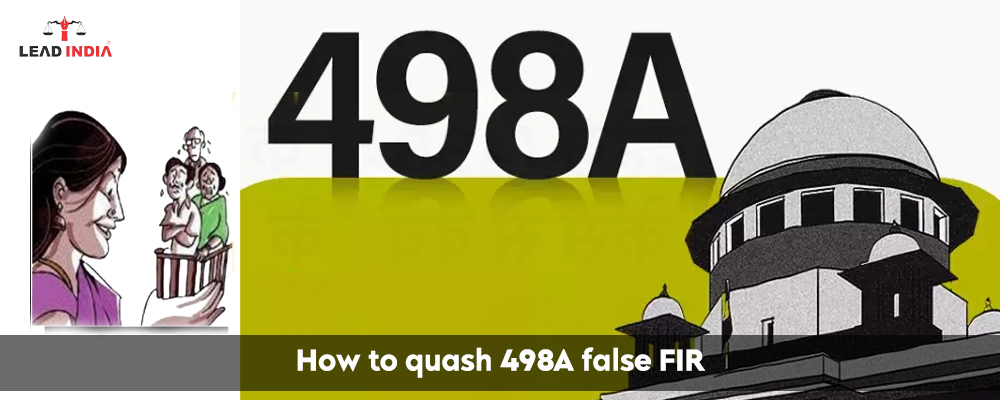Section 482 of the CRPC Act authorizes the High Court to protect the interests of both parties. Article 226 of the Constitution grants the power to file a writ petition for the quashing of an FIR. If the High Court thinks fit that the FIR was filed falsely to suppress and trouble the aggrieved party, it has the authority to quash the FIR.
Need A Legal Advice
The internet is not a lawyer and neither are you. Talk to a real lawyer about your legal issue

Legal provisions to quash 498a false allegation:
Inherent Powers of the High Court under Section 482 (1) of the Code of Criminal Procedure: The management has the right to act justifiably to achieve justice. The High Court has the authority to quash a FIR if it is found to be filed maliciously to cause trouble for the aggrieved party. Individuals charged with non-compoundable offenses have the right under Article 226 of the Constitution to file a writ petition under section 482(1) of the CrPC. The petitioner must prove to the High Court that the FIR against him was filed maliciously to annoy or trouble him/her.
Section 498A of the Indian Penal Code (IPC) addresses the offense of subjecting a woman to cruelty by her husband or relatives. Cruelty is defined under section 86 of THE BHARTIYA NYAYA SANHITA 2023. ‘Cruelty is also defined under Section 13(1)(ia) of the Hindu Marriage Act that causes bodily, mental, or economic anguish to others. Cruelty is a subjective idea that is determined by time, place, or person, as well as the facts and circumstances of the situation. According to the section, anyone who is a woman’s husband or a relative of her husband and subjected her to cruelty is punishable. Cruelty can take many forms, including punishment, torture, mental trauma, physical abuse, emotional abuse, and financial harassment, harassment of a women with a view to coerce her. The essentials of cruelty include cruelty, crumarried women, cruelty in connection with demand for dowry
How to quash 498A false FIR
1. Gather evidence.
- Alibi proof: Document your whereabouts during the alleged acts of cruelty.
- Financial records: Show adequate financial resources to maintain the spouse’s standard of living, contradicting claims of cruelty.
- Communication records: Text messages, emails, or voice recordings that show positive interactions with your spouse in response to abuse allegations.
- Witness statements: Statements from people who can attest to your good character and relationship with your spouse.
- Medical records: If applicable, collect medical records demonstrating the absence of injuries or conditions supporting cruelty claims.
- Evidence of mala fide intentions: Any evidence that the FIR was motivated by personal vendetta or ulterior motives.
2. Legal Representation:
- Finding a reputable lawyer who specializes in matrimonial and criminal law is crucial. They can provide advice on the necessary evidence and potential legal options. Write the petition to cancel the FIR efficiently, emphasizing discrepancies and a lack of evidence. Represent you in court and present your case convincingly.
3. Petition Options:
- Section 482 CrPC authorizes the High Court to prevent misuse of the legal process. Sessions Court under Section 483 CrPC. Applicable if the complaint could have been heard in Sessions Court.
4. Drafting the Petition:
- Clearly describe the grounds for quashing the FIR. The fabrication of cruelty allegations. There is no material evidence supporting the claims. The complainant had malicious intent. Lack of jurisdiction (if filed in the incorrect court).
- Provide clear evidence and precedents to back up your arguments.
- Request that the court dismiss the FIR and halt further investigation.
5. Court hearing:
- Both parties present their arguments.
- The court reviews the FIR, documents, and witness statements.
- Prepare to answer questions and clarify details.
6. Court Decision:
- Based on evidence and arguments, the court may dismiss the FIR entirely. Direct further investigation based on specific aspects. Dismiss the petition, leaving you with other options, such as seeking bail.
7. Important points:
- Timely action following the FIR is critical to avoid unnecessary harassment and delays.
- Strong Evidence: Success requires the development of a strong case supported by compelling evidence.
- Court Discretion: The court makes the final decision and exercises discretion when weighing evidence and arguments.
- Alternatives: If the petition is denied, you may seek anticipatory bail or other legal remedies.
It is advisable to consult a lawyer to quash a false FIR. Lead India offers various legal services, including free legal advice and online information. You can talk to a lawyer and ask a legal question on various matters through our platform.





 Talk to a Lawyer
Talk to a Lawyer